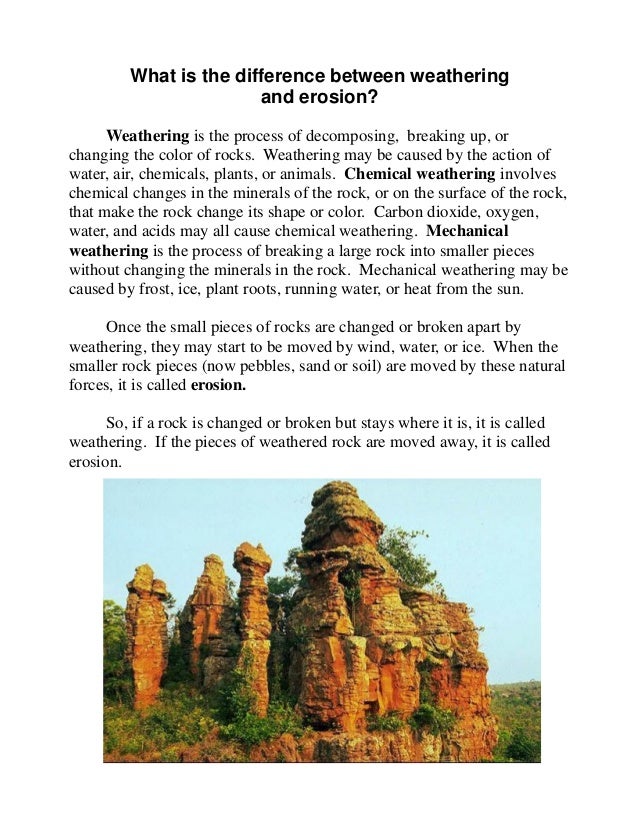
Weathering and erosion constantly change the way the rocky landscape of Earth. However the fundamental processes behind erosion and weathering are vastly different.

If the pieces of weathered rock are moved away it is called erosion.
Difference between erosion and weathering. Weathering and erosion are processes by which rocks are broken down and moved form their original location. They differ based on whether a rocks location is changed. Weathering degrades a rock without moving it while erosion carries rocks and soil away from their original locations.
Weathering often leads to erosion by causing rocks to break down into smaller pieces which erosive. Weathering refers to breaking up of rocks into smaller fragments as a result of forces of nature while erosion is a set of processes that involve winds flowing water and movement of ice glaciers that take along the fragments created by weathering to newer locations. Weathering they may start to be moved by wind water or ice.
When the smaller rock pieces now pebbles sand or soil are moved by these natural forces it is called erosion. So if a rock is changed or broken but stays where it is it is called weathering. If the pieces of weathered rock are moved away it is called erosion.
5 Zeilen Erosion and weathering are the processes in which the rocks are broken down into fine particles. 5 Zeilen Erosion refers to the displacement of the solids through wind water and ice. However the fundamental processes behind erosion and weathering are vastly different.
The key factor in erosion is movement. Erosion describes the movement of soil and mineral particles that have been loosened from the substrate. Weathering occurs without movement.
The main difference between Weathering and Erosion is that Weathering means a change in wind or temperature whereas Erosion means movement rock soil etc. To a new location. Erosion Weathering occurs in a specific place.
In this video I explain the difference between weathering and erosionWeathering weakens. Weathering breaks down the rock and erosion carries the rock away. Difference Between Erosion And Weathering is that Weathering is the chemical and mechanical phenomenon that breaks and sculpts rocks.
Erosion however drags the remaining fragments leading them away. You can define the erosion and degradation and transport of the soil or rock which produces different processes on the surface of the Earth. While weathering involves the decomposition of rocks erosion refers to the removal of soil particles rocks and other earth materials from one location to another caused by wind and water.
Mass wasting is the movement of soil sand rock and residue down a slope driven by gravitational force. Erosion involves the movement or carrying away of rocks and other materials and thus is a dynamic process. Weathering is caused by direct contact with the atmospheric conditions such as air pressure etc.
Erosion is caused by agents such as water wind ice human activities etc. Weathering is the process where rocks are worn away or broken down into smaller pieces by wind water or plants etcErosion happens when these broken rocks a. The main difference between weathering and erosion is that weathering is a long term process but in contrast erosion is a short term process.
Both weathering and erosion are geological processes. These processes occur in nature on Earths crust. The difference between weathering and erosion is.
Weathering causes a quick change in landforms and erosion causes a slow change in landforms. Weathering breaks rocks into sediments and erosion moves sediment from one place to another. Weathering describes the breaking down or dissolving of rocks and minerals on the surface of Earth.
Water ice acids salts plants animals and changes in temperature are all agents of weathering. Weathering and erosion constantly change the way the rocky landscape of Earth. Erosion is the process of eroding or being eroded by wind water or other natural agents.
Erosion can dissolve rock weakening it or turning it into tiny fragments. The process of Erosion moves bits of rock or soil from one place to another.